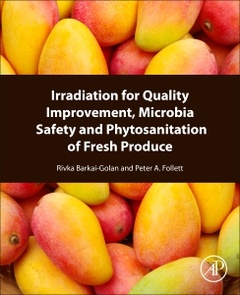Irradiation for Quality Improvement, Microbial Safety and Phytosanitation of Fresh Produce
Auteurs : Barkai-Golan Rivka, Follett Peter A.

Irradiation for Quality Improvement, Microbial Safety and Phytosanitation of Fresh Produce presents the last six and a half decades of scientific information on the topic. This book emphasizes proven advantages of ionizing irradiation over the commonly used postharvest treatments for improving postharvest life of fresh fruits and vegetables to enhance their microbial safety.
This reference is intended for a wide range of scientists, researchers, and students in the fields of plant diseases and postharvest diseases of fruits and vegetables. It is a means for disease control to promote food safety and quality for the food industry and can be used in food safety and agriculture courses.
1. Irradiation for Quality Improvement and Microbial Safety of Fresh Produce2. Ionizing Radiation for Shelf Life Extension3. Postirradiation Changes in Fruits and Vegetables4. Irradiation Effects on Mycotoxin Accumulation5. Sprout Inhibition of Tubers, Bulbs, and Roots by Ionizing Radiation6. Irradiation for Quality Improvement of Individual Fruits7. Irradiation for Quality Improvement of Individual Vegetables Including Mushrooms8. Safety of Fresh and Fresh-Cut Fruits and Vegetables Following Irradiation 9. Benefits of Fruit and Vegetable Irradiation, Labeling and Detection of Irradiated Food, Consumer Attitude, and Future Research10. Phytosanitary Irradiation of Fresh Horticultural Commodities for Market Access11. Phytosanitary Irradiation: Generic Treatments12. Phytosanitary Irradiation: Combincation Treatments13. Current Issues in Phytosanitary Irradiation
Dr. Peter Follett is a Research Entomologist with the USDA Agricultural Research Service (ARS) in Hilo, Hawaii, where he coordinates research efforts to develop new or improved postharvest treatments to control quarantine pests that restrict the export of tropical fruits and vegetables. He has authored or co-authored 180 scientific publications and is recognized internationally as an expert in the areas of postharvest entomology and commodity quarantine treatment. His research on the radiobiology of more than three dozen insect pests has been used to develop first-ever generic irradiation treatments, which are now used worldwide and have helped expand international trade in tropical fruits and vegetables. Dr. Follett received the Entomological Society of America (ESA) Distinguished Achievement Award in Horticultural Entomology, the USDA Secretary’s Group Honor Award for Excellence, and the Federal Laboratory Consortium (FLC) Award for Excellence in Technology Transfer for his accomplishments in phytosanitary irradiation research and commodity quarantine treatment development.
- Discusses pathogen resistance to common chemical synthetic compounds
- Presents up-to-date research and benefits of phytosanitary irradiation
- Includes comprehensive research for alternative treatments for postharvest disease control
- Provides the non-residual feature of ionizing radiation as a physical means for disease control to produce chemical free foods
Date de parution : 06-2017
Ouvrage de 302 p.
19x23.3 cm
Thèmes d’Irradiation for Quality Improvement, Microbial Safety... :
Mots-clés :
Alleviating hunger; Alteration of postharvest populations; Analytical methods for irradiation identification; Antioxidant activity; Antioxidants; Association between radio-degradation of mycotoxins and nutritional elements; Button mushrooms; Cell wall permeability; Chaga mushrooms; Changes in chemical components; Clearances; Cold treatment; Combined treatments; Consumer attitude; Consumer perception; Content of ascorbic acid; Damage repair capacity; Dose terminology; Effects on chemical and nutritional content; Enhanced sweetening; Ethylene involvement; Ethylene production; Food safety; Furan formation; Future research; Heat treatment; History; Human pathogenic bacteria; Insect pest; Ionizing radiation; Irradiation benefits; Irradiation effects on fresh-cut fruits and vegetables; Irradiation with modified-atmosphere packaging; Irradiation; Labeling; Leaf volatiles; Microbial safety; Modified atmosphere; Mushroom mutants induced by irradiation; Pesticides; Phenols and polyphenols; Phytoalexins involvement; Phytosanitary; Plant essential oils; Pleurotus mushrooms; Postharvest treatment; Postharvest; Postirradiation changes; Preparation of fresh-cut produce; Quality improvement; Quarantine treatment; Radiation dose; Radiation effects on ripening and senescence quality parameters; Radiation purposes; Radiation sources; Radiation; Radio sensitivity of Penicillium and Aspergillus species; Radura; Reduction of food losses and food waste; Regulations; Rice mushrooms; Shelf life extension; Shiitake mushrooms; Susceptibility to infection; Water activity effect on Aspergillus carbonarius; Wholesomeness; Wild edible mushrooms; X-ray



